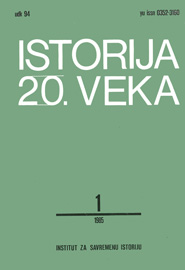BRITANSKA BALKANSKA POLITIKA I JUGOSLOVENSKO - BUGARSKI PREGOVORI - NOVEMBAR 1944. - MART 1945.
BRITISH BALKAN POLICY AND YUGOSLAV - BULGARIAN NEGOTIATIONS - NOVEMBER 1944 - MARCH 1945
Author(s): Milan RistovićSubject(s): Geography, Regional studies, Diplomatic history, Political history, Recent History (1900 till today), WW II and following years (1940 - 1949)
Published by: Institut za savremenu istoriju, Beograd
Keywords: WWII; Yugoslavia; British Balkan policy; Bulgarian negotiations; diplomacy; Balkan Federation; Soviet Union; USA;
Summary/Abstract: During the Second World War some of the old Alliance’s political plans were activated, but also some new concepts were conceived for establishment of the Balkan Federation or South-Slov Federation. These ideas were also supported among the Anti-Fashistic Forces, first of all Yugoslav and Bulgarian. Motives that inspired the Great Powers to bring this subject forward were various, as well as their political and ideological reasons, but their ultimate object was the same: to set out the preliminary actions for consolidating their position at this strategically important area. In this article, based on the British diplomatic materials concerned with the period from November 1944 until March 1945, the problem is regarded as a part of the diplomatic and political game. The Soviet Union supported these plans for Yugoslavia and Bulgaria to make a contract for alliance and collaboration, and helped the negotiations to take place as well. In the British Diplomatic Services this was regarded as the first step towards creating the „exclusive” South-Slov Federative State. This was to give the Soviet Union an opportunity for further expansion to the South - towards Greece, the last British South-Eastern strong point. An action that was taken to prevent the creation of either Alliance or Federation of Yugoslavia and Bulgaria lasted for several months continually, from the end of 1944 until the beginning of 1945 and only brought partial results: the negotiations were temporarily ceased, before all because the Soviet Union wanted to avoid widening of the gap in relations between the East and the West Alliance on the eve of the Peace Conference. But, still, this attempt in no way succeeded in preventing the action of bringing Yugoslavia and Bulgaria closer together. This article also includes inquiries into various kinds of political pres sure on Moscow, Belgrade and Sophia Diplomatic Services during the Yugoslav - Bulgarian affair. USA, as a British alliance, also made its appearance in this political event, although ostensibly not very interested in British „Balkan concerns”. Questions concerning this problem, arguments of the Alliances, as well as the way they led this diplomatic game clearly presented severance of the relations among the Great Powers. Also, their political orientations and methods were obvious, especially towards „small countries” which were to remain only an object of the policy of the Great Ones.
Journal: Istorija 20. veka
- Issue Year: 1985
- Issue No: 1
- Page Range: 69-94
- Page Count: 26
- Language: Serbian

